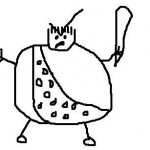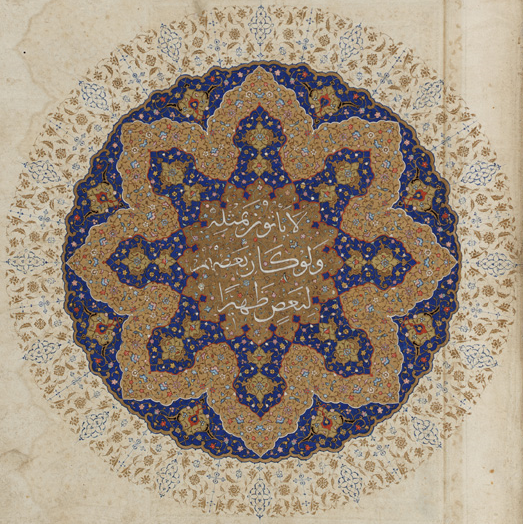
Pixar’s Brave is every fairy tale and none of them. It’s every trope and none of them. It’s filled with lovable scamps, bumbling eccentrics, defiant courage, enchanted landscapes, stifling expectations and unintended consequences. And it’s filled with beautiful brogue and wayward redheads.
I’m going to talk my way through this movie. It’s currently 10:30pm. I left the movie theater 30 minutes ago, oddly silent as I tried to figure out what the message was that I got from that film. What follows is my first attempt to process the story, and to figure out whether or not it follows in the footsteps of Tangled, the cinematic anthem for ex-fundamentalist daughters.
My review will be full of spoilers. If you prefer to watch the movie unspoiled, please stop here. Below the jump is where the wild things are: any plot point is fair game!
Brave is a coming-of-age story about a mother and daughter.

Let that sink in for a moment. Coming of age stories never feature mothers and daughters. They’re a father-son genre. They’re often explicitly about separation from one’s mother and finding independent manhood. Half the time, the main character’s mother is dead, absent or emotionally withdrawn.
Does having not only (a) a female lead, but also (b) a conflict driven not by romance or masculinity but by a daughter’s fight for independence and a mother’s pragmatic (if stifling) plans alter the meaning of the coming-of-age trope? Let’s think about it.
Merida is a total failure as a princess.
She admits it – nay, proclaims it: she hates that ladylike crap. Unlike Rapunzel, Merida is not at all afraid to tell her mother how she feels. On the contrary, she’s a frothing bundle of anger at ridiculous gender norms and the restrictions of being a role model to her clan and its allies. She throws some serious barbs at Elinor (her mother), who has spent Merida’s whole childhood telling her what a princess shouldn’t do.
“I’d rather die than be like you!” Merida howls.
“I want my freedom!” Merida storms.
And she slices her mother’s family tapestry in half with her sword, right between the figures of herself and Elinor. (SYMBOLISM. In case you didn’t notice.)

Elinor, on the other hand, rolls her eyes and sighs at her daughter’s impulsiveness, stuffs her into a corset and throws her cherished bow into the fireplace. Both women have now destroyed the things most precious to each other: Merida’s bow, symbolizing independence, and Elinor’s tapestry, symbolizing family.
Merida’s rebellion is actually that: rebellion. It’s defiant and petulant and generally immature. Which is fine, since the real plot hasn’t even started yet. But it makes her a less sympathetic character to daughters of Christian patriarchy than Rapunzel because, unlike Rapunzel and unlike us, Merida doesn’t give a damn about pleasing her mother. She’s the teenager that the daughters of Christian patriarchy would have never dared to be.
In fact, her rebellion is a bit… well… overblown. She rebels so hard that she runs off to the woods, meets a witch and sells her heirloom pendant in exchange for a cake that will “change” her mother and thus allow her to change her own fate. There is something really interesting to the idea that your mother is your fate – that’s certainly a message I received as a daughter of Christian patriarchy. That’s the idea I hated – even though I loved and admired my mother.
It is hard, after all, to reject the life your mother lives without rejecting your mother herself.
There is a softer note, however, sounding underneath the storm of Merida’s frustration: “I’m not doing this to hurt you!” she yells at her horse, a surrogate for her mother, while Elinor admits to Fergus (Merida’s father, in Merida’s place) that she had her doubts about that whole courtship thing, too. That rang true to me. Even when my mother was convinced that I was in rebellion against God and my father for selfish reasons, I tried over and over again to tell her that I wasn’t rejecting her, that I loved her, and that this was about survival for me, not rebellion. There’s a note of truth beneath Merida’s immaturity: finding your own fate is necessary, even if it disappoints those around you.
Merida’s mother comes with her on her journey to maturity.
Not only does Merida have a mother, and one who takes an active role in her life, Merida has a mother who grows with her. I think that’s a really affirming message. Merida’s manipulative scheming turns her mother into a bear, which puts her in mortal danger. Elinor’s husband, after all, lost a leg in a battle with a bear and has dreamed of settling the store since Merida was a child. Realizing that she has put her mother’s life in jeopardy, a regretful, panicked Merida helps Elinor (in bear form) escape into the woods. The two set off to undo the spell. In a sense, they’re both learning the same lesson: turning each other into something they’re not will only hurt both of them.

But the witch is gone, as witches tend to go. She’s left a voicemail message bubbling in a cauldron, instructing Merida that the spell will become permanent by the second sunrise after Elinor ate the magical cake. The key to undoing it, however, is a riddle:
Fate be changed
Look inside
Mend the bond
Torn by pride
Yeah, you see where this is going. We follow Merida and Elinor back to the castle, as Merida believes sewing up the tapestry between her mother and herself is the way to restore her mother to her former self. Along the way, we get to see Elinor loosen up a bit. She learns how to fish like a bear, then accidentally starts to act like a bear and scares the both of them. Elinor won’t be Elinor anymore – only a bear will be left – if they don’t fix that spell soon. Fear of her mother ceasing to be herself drives Merida through the rest of the movie. Along the way, Elinor comes to admire her daughter’s skills, and the two take turns saving each other from various perils like exploding cauldrons and cursed ancient bears who used to be selfish men (the prior visitor to the con-artist witch).
Brave does not succumb to a Beauty and the Beast resolution.
Without reciting the plot of the ending blow-by-blow, I will say how much I appreciated the fact that there was no romance in this movie. Several critics have claimed that Brave breaks no new ground with its dated, 1980s “girl power” message. In part, that’s bad luck: The Hunger Games broke so much new ground that we’re all still reeling a little bit from the impact. But I do want to point this out. Brave is the only female-led movie I have ever seen that does not even hint at an impending romance. Even the Hunger Games, groundbreaking as it is in its raw exposure of the obligations and dangers involved in romance, still shows Katniss wrestling with her feelings for two boys. This movie does not.
I was practically gnawing my fingernails waiting to see the curse of the ancient bear (the selfish man who visited the witch first) lifted and the motley creature turned into a handsome prince for Merida to wed. Doesn’t happen. The motley bear is killed and the spirit of the ancient warrior put to rest. Merida doesn’t choose one of the clansmen, either. The ending shows Merida and Elinor riding together on the hills. This story begins and ends with their relationship: a suitor is not even thrown in as a reward for Merida’s change of heart. If she finds love (outside of her family), it’ll be in a sequel.
Merida wins.
This story isn’t just about Merida learning to please her mother. As a daughter of Christian patriarchy, I sat through this movie primed for and dreading the possible conservative moralizing about the importance of obedience and getting along. Indeed, some reviews have called the movie traditionalist and interpreted the storyline as an ode to the unity of the nuclear family. That’s not how I read it at all.
Cinema Autopsy calls Brave a “moralising tale about the importance of obeying your parents.”
No, it’s not. Merida does not obey her parents. Not even in the end. She apologizes to her mother for her rudeness, for humiliating her, for not valuing her mother’s skills or trying to understand her point of view. But Merida does not apologize for disobedience. Instead, her mother has a change of heart, too.
What’s the outcome of this story? The end of arranged marriage. Merida, finding sudden power in her mother’s courtly manners, talks her clan and its allies out of going to war over her. She apologizes because her behavior has caused the ruckus, but the solution she proposes is not to choose one of the suitors. It’s to change the paradigm.
Merida arrives at this solution with help from her mother, who mimes a speech to her while pretending to be a stuffed bear at the back of a crowded dining hall. The speech instructs that the clans release their children from political-economic restrictions and allow them to marry for love. Merida and her mother share a long look of mutual understanding and love: both of them had to bend a little to reach peace.
If there is a moral to this story, I don’t think it’s about squashing rebellion or pleasing authoritarian parents. It’s not even really about compromise: in the end, Merida gets what she wants. She doesn’t have to get married unless she wants to.
Brave is about a mother and daughter learning to see each other as individuals.
It’s about a mother and daughter appreciating one another’s different personalities and even enjoying them. It’s about learning to be a family without sticking to prepackaged roles. Brave is about telling your mother that you love her, even if you don’t want to be just like her. Which is what real, adult love looks like.
 Merida didn’t stop being herself to please her mother. She became a kinder, more thoughtful version of herself. Elinor, too, learned to be a better version of herself. She let go of control of her daughter and began to enjoy their relationship, free from hierarchy and rules. This coming-of-age story isn’t about stepping into a role (like the father-son trope), but sidestepping roles altogether.
Merida didn’t stop being herself to please her mother. She became a kinder, more thoughtful version of herself. Elinor, too, learned to be a better version of herself. She let go of control of her daughter and began to enjoy their relationship, free from hierarchy and rules. This coming-of-age story isn’t about stepping into a role (like the father-son trope), but sidestepping roles altogether.
Brave may have arrived in the shadow of the bombastic Hunger Games (which I love, too, don’t get me wrong), but it has plenty to offer in its own right. Even though Merida is a princess, even though the trap set for her is a traditional one (arranged marriage), her path to independence takes a few unexpected turns. She learns that she can have her freedom and her mother’s love, too.
That’s radical.












